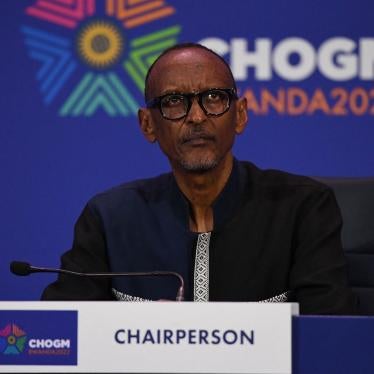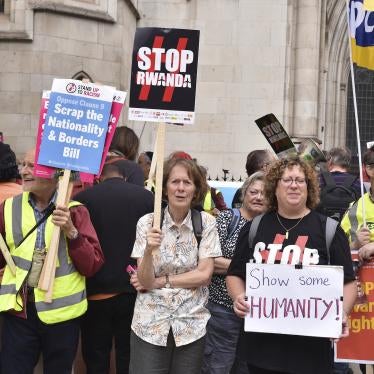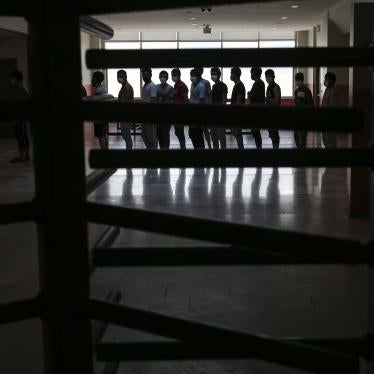In recent years, we have seen an alarming trend of wealthy, destination countries seeking to close their doors to asylum seekers and refugees. The United Kingdom is no exception.
The UK often speaks of its proud history of offering sanctuary to those fleeing persecution and being a compassionate and welcoming country. The UK and other European states’ response to people fleeing Ukraine following Russia’s full-scale invasion gave us a glimmer of hope that a humane approach is possible (although the UK’s approach still fell behind that of its neighbors).
At the same time, the UK is completely abandoning its duties towards other people arriving on its shores. The government is attempting to expel asylum seekers to Rwanda, which cannot be considered a safe third country for asylum seekers. Human Rights Watch has extensively documented human rights violations there – arbitrary detention, torture and extrajudicial killings, including of refugees who protested a reduction in their food rations.
In June, the European Court of Human Rights effectively grounded the first expulsion flight to Rwanda. The UK government responded by including a clause in the proposed Bill of Rights Bill, commonly known as the Rights Removal Bill, that tells UK courts not to take account of any interim measure issued by the European Court.
But the Rwanda scheme is just one part of a broader raft of anti-refugee policies.
In April, the UK passed perhaps one of the most draconian asylum law in the UK’s history, the Nationality and Borders Act 2022. It allows the UK to push back boats at sea, expel asylum seekers to countries they have never even set foot in, criminalizes seeking asylum, and allows discrimination against refugees based on how they arrived in the UK.
It is telling that UK border officials, tasked with carrying out these policies, have taken the government to court over pushbacks and the Rwanda scheme through their union.
More recently, the government signed another costly deal with France to stem Channel crossings by small boat. This means more surveillance, patrols and detection dogs, which only risks making the lives of people in encampments in northern France even more miserable and compelling them to attempt ever more dangerous crossings.
The UK is following in the footsteps of countries like Australia and the United States that have spearheaded externalized migration controls, policies that disproportionately affect Black and brown migrants and asylum seekers.
The US continues to deny access to asylum, expelling and pushing back migrants at its border with Mexico. Australia began turning back boats at sea in 2001 and has frequently touted its “model” of offshore detention on Nauru and Manus Island which has been cruel, costly, ineffective and deadly.
At home, the UK’s asylum and immigration system is marred with serious systematic failures. Asylum seekers are living in limbo, waiting years for an asylum decision and housed in woefully inadequate, overcrowded and often inhumane and unlawful conditions.
It doesn’t have to be this way – not for the UK and not for other wealthy countries.
First, countries should put the human rights of asylum seekers and migrants squarely at the center of their asylum and immigration policies. This requires treating everyone with dignity and ensuring that they are afforded due process, including access to fair and effective asylum procedures, and protection from being expelled to somewhere where they would be at risk.
This does not preclude states from managing their borders, but they need to do so in compliance with their international obligations, including respecting everyone’s right to seek asylum, by whatever mode of travel available to them.
Second, if states are serious about reducing the number of people risking their lives on treacherous journeys by boat or on foot, potentially in the hands of people smugglers or traffickers, they need to expand refugee resettlement and other pathways for legal migration so people can travel safely to their territories, such as routes for work and study.
Many countries, especially those with aging populations, can benefit from the cultural, economic and social benefits that refugees and other migrants bring.
At a time when many people are being forced to flee their homes including because of conflict, violence, poverty, and climate change, it is more important than ever for countries to live up to their commitments to global responsibility sharing.
Wealthy, destination countries foisting their responsibility for refugees onto other countries and creating hostile conditions for those who do manage to arrive sets a very dangerous precedent. Not only can this trigger a race to the bottom among developed states, but also lead other countries already disproportionately shouldering responsibility for the majority of refugees to renege on their international obligations.
Global challenges require global solutions, and every country should do its fair share to protect the world’s refugees and respect human rights at their borders.










